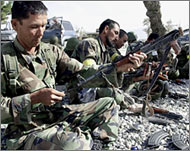Kabul to be demilitarised
Afghanistan’s capital Kabul is to be demilitarised after the defence ministry agreed to pull out heavy weapons and factional fighters.

A commission formed by the Afghan army chief of staff, General Bism Allah Khan and members of the NATO-led foreign peacekeeping operation in the capital, is working to locate all the weapons and the fighters, ministry spokesman Muhammad Zahir Azimi said.
“We are fully prepared to demilitarise Kabul on the basis of the Bonn agreement,” he said. “The commission is trying to find suitable places to put the heavy arms and the armed men.”
A date would be announced next week for the actual start of the demilitarisation, he said.
The decision is in line with the Bonn peace agreement that brought President Hamid Karzai to power.
The demilitarisation plan could not be enforced until now, as thousands of fighters loyal to Defence Minister Muhammad Qasim Fahim remained in Kabul with their heavy weapons, including tanks.
Fahim’s Northern Alliance forms the backbone of the Afghan government which came into being after US-led forces toppled the Taliban regime.
Fighters loyal to Fahim control in the Panjsher valley and adjoining areas to the north of Kabul and are reluctant to give up their weapons.
US pressure
However, facing pressure from US-led forces, Fahim is required to surrender weapons from his Panjsher power base to a new Western-trained national army next month, before the mainly Japanese-funded disarmament project extends to the strategic valley.
 |
|
The surrendered weapons will be |
If he fails to comply, he risks provoking the wrath of the United States, but if he does so, he faces the prospect of losing the confidence of his main constituents.
The latter risk was illustrated this week when Fahim had to rush by helicopter to the Panjsher to placate fighters reluctant to give up arms including tanks, artillery and rockets.
Members of Fahim’s Shuraye Nazaar faction argued that President Hamid Karzai’s government had not provided the weapons in the first place and they intended to keep them to protect against any future “danger”.
Fahim tried to explain to his supporters it was time to hand over the weapons to help build a national army.
“He has managed to calm down people for now,” said one reliable Panjsheri source, “but that is not the end of the story, because people are still reluctant to follow his orders.”
Fahim in a jam
Sources close to Fahim said the minister was at a crossroads. “He says he does not know what to do,” said one.
The sources said he worried about being called a “traitor” by his own supporters if he went along with the disarmament, demobilisation and reintegration (DDR) plan.
Mainly funded by Japan, DDR aims to disarm 100,000 fighters loyal to regional strongmen and former leaders like Fahim, rather than the central government.
The plan and the defence minister’s cooperation is seen as vital to the Western-backed Karzai’s efforts to extend his rule beyond Kabul, where international peacekeepers maintain security.
Analysts believe Fahim has set his sights on the vice-presidency after elections due to be held in mid-2004.